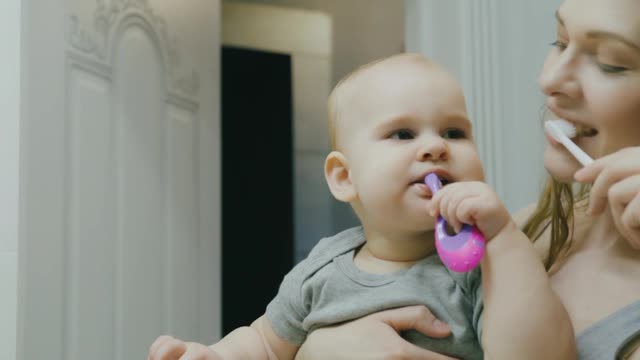Premium Only Content

Your baby’s brain: How parents can support healthy development.
Your baby’s brain: How parents can support healthy development
Your baby's brain needs a strong foundation.
Loving, consistent, positive relationships help build healthy brains and protect your baby’s brain from the negative effects of stress.
Everyday experiences help shape your baby’s brain—from your daily routines to the people your baby comes in contact with.
Your baby’s brain is built over time: It starts during pregnancy, and continues through to early adulthood. And like a building, it needs a strong foundation.
The brain is made up of several different areas that control everything we do—from hearing and walking to problem-solving and how we feel. Each area has millions of brain cells, or neurons. These neurons communicate with each other by passing chemical messages over tiny spaces called synapses. As the messages are repeated over and over, more links are made and “neural pathways” are formed. Think of these pathways as the brain’s “wiring.” In the first years of life, these connections develop at an extremely fast pace.
So how does this development happen? That’s where parents come in. You can help your baby’s brain develop in healthy ways. It doesn’t take special toys or equipment, and it’s easier than you might think!
Did you know…?
Your baby’s brain wiring is not fully connected at birth. It is very active, changing and developing in response to what’s going on all around them. It is the day-to-day experiences—activities like playing, being read to, learning, and interacting and being responded to by people—that helps to develop your baby’s brain.
How well all the wiring gets set up—that is, how your baby’s brain develops—will affect their ability to learn language, solve problems, and do well in school. Later in life, it can affect their physical and emotional health and how they get along with other people.
Relationships are crucial. Loving, consistent, positive relationships help build healthy brains and protect your baby’s brain from the negative effects of stress.
Even very young infants can experience stress when the places they live and play in feel unsafe, or are frightening. “Toxic” stress—which is much more serious than short-lived, everyday stress—is caused by persistent problems like extreme marital conflict, poverty, abuse, neglect, being exposed to violence, having a parent who misuses drugs or alcohol, or having a parent with an untreated mental illness. Toxic stress is harmful to your baby’s developing brain. It can lead to physical, learning and emotional problems in childhood, and these problems can carry on right into adulthood. If you’re concerned about the situation in your home, talk to your doctor or your baby’s doctor.
Your baby’s developing brain needs:
Responsive, nurturing, positive experiences: Everyday experiences help shape your baby’s brain—from your daily routines to the people your baby comes in contact with. Babies need to live and play in healthy spaces with opportunities to learn and grow. And they need you to learn how to recognize when they are tired, or hungry, or stressed or that they want a cuddle or hug from you. Responding warmly and predictably to your baby and creating routines help babies feel safe. It shows them that that they can count on you when they are sick, upset or distressed, and that you can meet their needs. Babies need their parents and caregivers to respond to them in loving, caring and consistent ways.
-
 2:15
2:15
WFTX
3 years agoYour Healthy Family: Talking to other parents about vaccination status
36 -
 6:44
6:44
diagonmerger
3 years agoFoods that Makes Your Brain Healthy and Fight Aging
17 -
 29:41
29:41
Fit+Faith with Dr. Melody Stevens
3 years agoHealthy Christian Women Podcast: Episode 025 - Your Brain on Sugar
48 -
 59:02
59:02
Russell Brand
2 hours agoIs Free Speech Under Threat? Australia’s U16 Social Media Ban, & Maddow vs Jay Bhattacharya – SF501
30.2K33 -
 LIVE
LIVE
The Charlie Kirk Show
1 hour agoTrump's Tariff Brilliance + Crushing Lawfare Forever | Sen. Moreno, Habba, O'Keefe | 11.26.24
11,782 watching -
 LIVE
LIVE
TheAlecLaceShow
1 hour agoTrump Threatens Tariffs on Mexico & Canada | Jack Smith Drops Charges | WW3 | The Alec Lace Show
536 watching -
 6:57
6:57
Rethinking the Dollar
15 hours agoCommodities Boom Incoming: Why Gold and Silver Are Leading the Charge
5652 -
 LIVE
LIVE
Sgtfinesse
1 hour agoSarge's 1st Stream on Rumble
461 watching -
 58:23
58:23
The Dan Bongino Show
4 hours agoDemocrats Enter Full Panic Mode (Ep. 2378) - 11/26/2024
474K1.07K -
 58:04
58:04
The Rubin Report
2 hours agoCNN Host Gets Visibly Angry as Her Trap for Conservative Backfires in Her Face
25.6K41